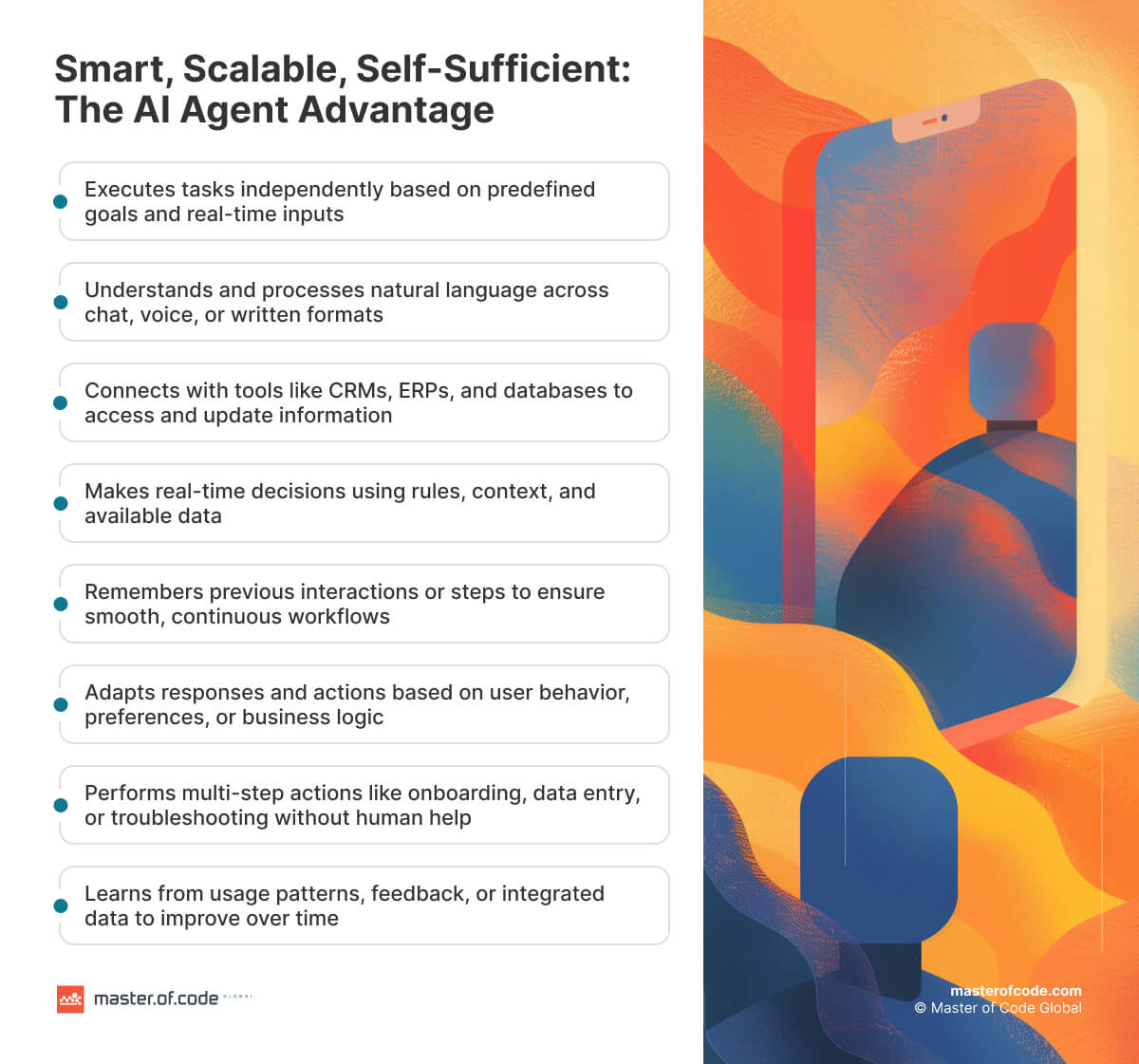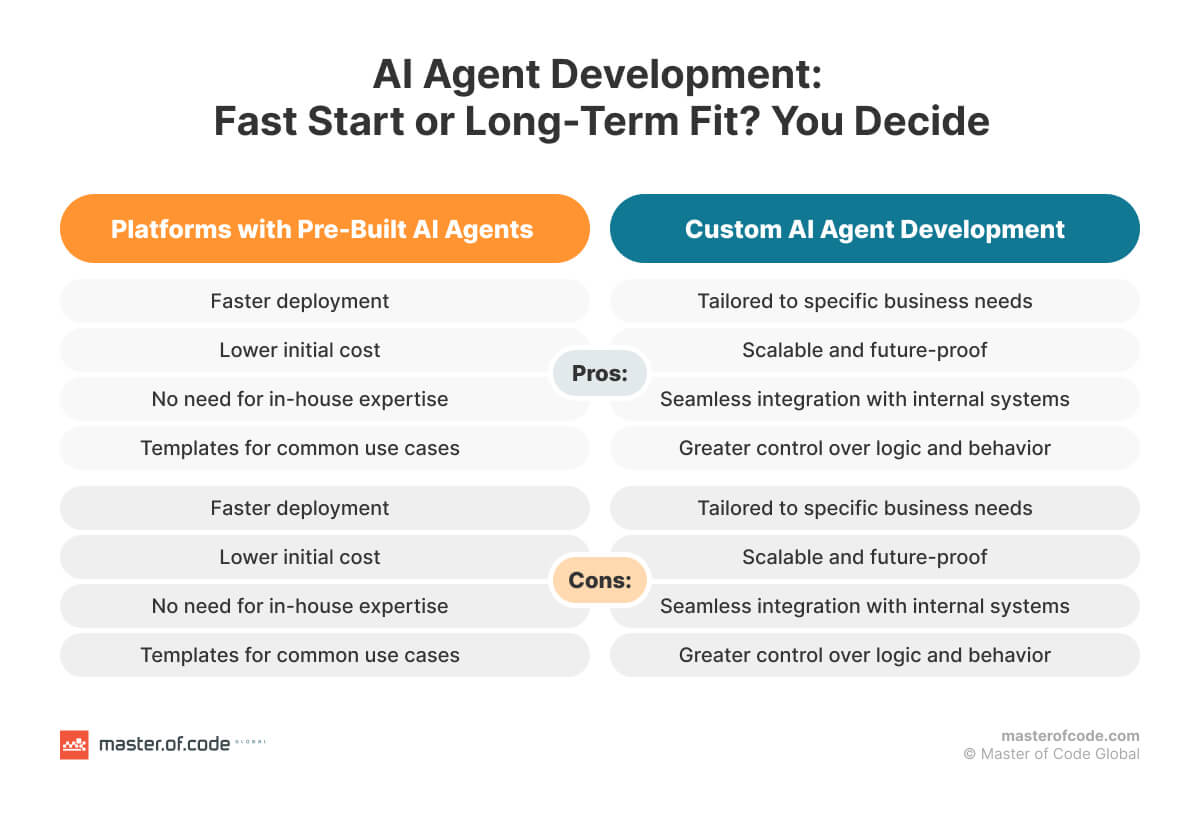A few weeks ago, our marketing and sales team talked to William, a Head of Innovation at a fast-scaling healthcare company who was asked to find an AI partner. In just one week, he spoke with over ten vendors. Some didn’t support the tools his organization used. Others couldn’t meet basic compliance needs. A few looked promising but didn’t feel like a good fit.
He wasn’t looking for magic—just someone who understood his goals and could deliver without adding more complexity.
We’ve had a lot of conversations like this lately. So, we put this list of AI agent development companies together. For teams like his. For people like you. If the search has been frustrating, we hope this saves you time and helps you find the right fit.
And if you want to see how we might fit into your plans—our door’s open.
Table of Contents
Why Everyone’s Talking About AI Agents—and What They Actually Do
Intelligent agents are autonomous software that can make decisions, perform tasks, and interact with users or other systems, often with little to no human oversight. What makes them different from traditional automation? It’s their ability to reason, adapt, and act based on goals rather than just fixed rules.
Think of them as digital workers. They can schedule meetings, summarize documents, analyze customer behavior, or even orchestrate workflows across tools. Powered by large language models (LLMs) and multimodal inputs, today’s virtual assistants go beyond chat—they combine memory, planning, and tool use to complete multi-step processes.

Use cases span internal operations (like IT ticket resolution), sales (lead qualification), client support (case deflection), and HR (onboarding automation). The hype isn’t just hype—it’s a response to measurable business value. Autonomous intelligent systems reduce manual work, accelerate decisions, and free up human teams for higher-level strategy.
Real-world results back this up:
- One global bank cut customer service costs tenfold with virtual agents,
- A biopharma company sped up R&D by 25% and saved 35% of the time spent on clinical reporting.
- In IT, teams using tech to upgrade legacy infrastructure saw productivity rise by up to 40%.
As our CEO, Dmytro Hrytsenko, noted: “While governments and global organizations are looking for ways to safely regulate AI and corporations are trying to do initial AI transformations, small teams are doing innovations at neck-breaking speeds, redefining the landscape every couple of weeks. The world is becoming a playground for AI agents, integrating into every part of life.”
The pace is relentless, and for companies ready to leverage this shift, the biggest question now is how to start. That begins with one key decision: choosing the right development partner.
AI Agents Sound Great—But Where Do You Even Start?
The truth is, building such an advanced application isn’t just about plugging into an LLM and hoping for the best. It requires defining goals, mapping workflows, choosing instruments, ensuring data access and security, and most critically, having the right development partner.
Why? Because the gap between a basic chatbot and a fully autonomous system is massive. You need a team that understands not just the tech stack, but also your business logic, integrations, and user expectations.
The market is growing fast, but it’s also crowded. From no-code platforms to custom engineering firms, hundreds of vendors claim they “do AI agents.” Some focus on simplicity, others on scalability. Few can do both.
That’s why we did the research for you. Below, we’ve mapped out two categories of top-rated AI agent companies—custom solution providers and platform-based tools—to help you find the right fit.
8 Top AI Agent Development Companies Leading the Way in Custom Development
Master of Code Global

Focus: End-to-end, high-complexity AI agent development with strategic integration
Master of Code Global brings a holistic, deeply consultative approach to engineering intelligent applications. Their strength lies in building bespoke, multi-functional interfaces from the ground up. These tools are equipped with reasoning capabilities, LLM integration, and seamless multi-system orchestration. Unlike providers that rely on off-the-shelf components, their team designs architectures tailored to the nuances of each company. Their assistants often span use cases like process automation, user engagement, and data analysis. Plus, applications are delivered with enterprise-grade security, performance monitoring, and omnichannel readiness.
Plus, their proprietary LOFT framework accelerates delivery with 43% less setup effort, up to 20% cost savings pre-MVP, and 3x faster support. This enables companies to scale smarter and faster. Their ISO 27001 certification and strong track record across industries reinforce their commitment to scalable, secure solutions.
Best fit for: Enterprise teams seeking a high-touch partner to build intelligent software that is designed to adapt, grow, and align with complex business strategies.
Markovate

Focus: Use-case-specific AI designed to streamline targeted workflows
Based on information provided in their case studies, Markovate focuses on building smart agents that solve clearly defined problems. These are often in operational, administrative, or analytical roles. Their portfolio includes applications in legal document review, insurance processing, and medical claims automation. They also emphasize quick value delivery by applying tools like crewAI and LLM-powered assistants into narrow, structured contexts. While their builds are typically not fully custom, they are configured to fit within existing systems and adapted through iterative performance optimization.
Best fit for: Companies looking to enhance task efficiency through artificial intelligence without rebuilding their tech stack. Especially beneficial in regulated or document-heavy environments.
Azumo

Focus: Model fine-tuning and agent deployment for targeted automation
Azumo provides development services with a strong emphasis on optimizing pre-trained LLMs for specific use cases. Their approach starts with foundational models—such as LLaMA, OpenAI, or Gemini. They adapt those to fit tasks like customer care, document summarization, or risk analysis. Rather than building generalized systems, Azumo concentrates on creating programs that operate efficiently within clearly defined routines. Their process includes integration with instruments like CRMs and ERPs, support for private model tuning under SOC 2 compliance, and continuous performance refinement.
Best fit for: Businesses seeking cost-effective, fine-tuned agent deployment. Works well for focused optimization or predictive workstreams within existing tech environments.
SoluLab

Focus: Custom AI systems with behavioral modeling and broad domain flexibility
SoluLab describes its development approach as highly adaptable, with an emphasis on tailoring solutions to match specific operational needs. Their offering includes a variety of copilots types—from reactive to logic-based—built using tools like AutoGen Studio and Vertex AI. The business emphasizes behavioral training as a core differentiator. This aspect allows agents to simulate human-like decision-making in dynamic scenarios. They also emphasize long-term performance tuning and post-deployment guidance, aimed at helping clients evolve their applications over time.
Best fit for: Businesses that require nuanced behavior, flexible design options, and a partner capable of adjusting systems as business conditions shift.
Entrans
Focus: Autonomous workflow integration, tailored AI systems that go beyond standard RPA, and industry-specific transformation
Entrans provides a full suite of Agentic AI services focused on transitioning enterprises from manual workloads to embedding autonomous decision-making. They design and deploy custom AI agents that can perform high-volume tasks, such as ticket triaging, lead qualification, and document processing. A flagship example is their proprietary Agent – Thunai, which automates end-to-end business processes. It can function as a voice, chat, and email agent that supports sales, support, and meeting assistance, and direct CRM updates. Their Agentic AI services include ongoing monitoring, continuous training to ensure agents adapt to industry standards, and evolve according to business.
Best fit for: Improving MVP cycles, mid to large enterprises, and Fortune 500 companies, modernizing legacy platforms.
Azilen Technologies
Azilen Technologies specializes in developing intelligent AI agents that act as self-sufficient digital partners, allowing companies to automate decisions, streamline workflows, and manage complex operations with remarkable precision. Azilen creates agentic systems that are context-aware, resilient, and production-ready by combining deep engineering knowledge with superior GenAI capabilities. These agents can read data, grasp operational context, communicate across systems, and carry out multi-step tasks with minimum human intervention. They seamlessly interact with ERPs, CRMs, data platforms, and APIs, allowing enterprises to eliminate manual work, accelerate operations, and maintain consistent operational performance.
Best fit for: Organizations looking to automate complex operational workflows, enhance decision-making with intelligent autonomy, or build scalable agent-powered platforms aligned with real business goals.
LeewayHertz

Focus: Modular solutions designed for integration into existing infrastructure
LeewayHertz positions itself as a builder of modular, task-focused digital agents that emphasize adaptability and integration. Their apps typically rely on well-known platforms like Vertex AI and AutoGen Studio, allowing them to move quickly from concept to deployment. According to their published offerings, they support both single- and multi-agent frameworks, with capabilities that span customer service, HR assistance, and IT intelligentization. Rather than custom-building every component, they apply a reusable model framework strategy, which can be cost-effective for companies with clearly defined workflows.
Best fit for: Organizations prioritizing plug-and-play automation that can scale across departments without requiring significant customization or long development cycles.
Rapid Innovation

Focus: Fast-track AI development with emphasis on model orchestration and MVP delivery
Rapid Innovation frames its intelligent engineering around speed and modular flexibility. As stated on their website, they offer guaranteed MVP delivery within 90 days. They build instruments capable of handling research, audits, and multi-step process automation. Their services also include custom development, behavioral modeling, and Conversational AI, with options for both single- and multi-agent systems. The firm highlights its use of structured workstreams and improved LLM inference, allowing for faster and more autonomous execution. Their messaging emphasizes rapid deployment and coordinated help, appealing to teams that prioritize time-to-market and practical, use-case-aligned builds.
Best fit for: Startups or enterprises aiming to launch AI-powered solutions quickly. Well-suited for those needing configurable copilots with fast timelines and iterative scaling paths.
6 Leading AI Agent Companies Delivering Plug-and-Play Intelligence
Teneo.ai

Teneo is a platform built for large-scale AI agent deployments. It is reported to have over 17,000 assistants in production across industries like telecom, banking, and retail. Brand positions itself as an all-in-one solution for automating Tier 1 support via Conversational and voice AI. The platform integrates tightly with enterprise tools and emphasizes measurable outcomes like reduced costs and faster resolution rates.
Key aspects:
- Automates high-volume interactions with up to 60% call containment
- Supports omnichannel service with voice, chat, mobile, and more
- Offers real-time reasoning and adaptive personalization using LLM orchestration
- Centralized platform to design, deploy, and monitor assistants
- Security and compliance features tailored to enterprise needs
- Reported savings of $32M+ monthly from users like Telefónica and Swisscom
While powerful, the platform is highly specialized toward contact center modernization, less suited for broader, non-customer-facing use cases without additional customization.
Zapier Agents

Zapier Agents let users create lightweight digital assistants that execute tasks across 8,000+ apps. Invented for non-technical teams, the platform focuses on speed, accessibility, and integration with tools like HubSpot, Jira, and Google Sheets. Autonomous systems are configured using plain English prompts and work by combining LLM output with live business data and pre-set automations.
Key aspects:
- Build and deploy agents in minutes without writing code
- Access prebuilt templates for sales, support, and meeting prep
- Pulls from synced knowledge sources (e.g. Notion, Confluence)
- Executes multi-step actions across instruments like Slack, Airtable, and Gmail
- Chrome extension for web-based research
- Backed by its ecosystem and 50,000+ user base
While flexible for task optimization, these solutions are better suited for narrow functions and may lack the depth and reasoning capabilities found in more advanced platforms.
Relevance AI

Relevance AI markets itself as a platform for building and managing collaborative virtual intelligent teams. It enables users to visually create agentic processes, assign skills, and deploy them across business functions like sales, support, SEO, and finance. The company promotes its “Workforce” feature as a way to build synthetic teams that coordinate tasks and adapt to new roles in real time.
Key aspects:
- No-code builder for assembling multi-agent workflows
- Prebuilt templates for lead qualification, inbox management, CRM enrichment, and more
- Copilots can be trained with custom instructions and upgraded using AI tools (e.g., search, transcribe, summarize)
- LLM agnostic—compatible with OpenAI, Anthropic, Meta, and Google models
- Drag-and-drop interface for real-time collaboration and task orchestration
- Integrates with common enterprise instruments through Zapier, Snowflake, and APIs
While versatile, the platform is geared toward fast setup and task automation, not deep customization or highly specialized behavior without third-party expansion.
Beam AI

Beam AI positions itself as an enterprise-ready platform for constructing and orchestrating teams of autonomous intelligent systems. Rather than focusing on single-use solutions, it emphasizes cross-functional automation with software tailored to departments like finance, healthcare, and HR. Its interface is designed for non-technical users, making configuration and launch accessible across business units.
Key aspects:
- 30+ specialized tools for functions like claims processing, order management, and customer onboarding
- Multi-agent orchestration with modular logic and collaborative workflows
- Flexible deployment options (cloud and on-prem), with SOC 2 compliance and localized data hosting
- Customizable personas for role-specific tone and interaction style
- Incremental learning capabilities that evolve based on task history and user input
While highly flexible, the platform’s extensive scope may require upfront effort to align configurations with nuanced, organization-specific processes.
Dust.tt

Dust presents itself as a platform designed to integrate deeply with company knowledge and processes. Marketed as an AI operating system, it enables non-technical teams to build, deploy, and manage collaborative agents in minutes without coding. It supports a broad set of business functions, from customer help to analytics, emphasizing fast setup and tailored contextual responses. Rather than focusing solely on conversation, Dust copilots are built to act—connecting to data, triggering actions, and improving gradually.
Key aspects:
- Visual interface for orchestrating teams of AI agents across departments
- Integrations with Slack, GitHub, Notion, and internal tools via API
- Model-agnostic (supports OpenAI, Anthropic, Mistral, and more)
- Chrome extension and Slack bot for in-context interaction
- Role-specific templates
- Enterprise-grade compliance (SOC2 Type II, HIPAA, GDPR)
Despite its ease of use and breadth, its customization is primarily constrained to predefined workflows unless extended through developer tools.
Lyzr AI

Lyzr is presented as a comprehensive platform for designing, deploying, and orchestrating enterprise-grade software. It markets itself as “agent infrastructure” with a core focus on automating full job functions, not just tasks. The company offers flexibility in deployment (cloud or on-prem), integrates Safe AI principles into its architecture, and facilitates low-code development for both business and technical users. Lyzr emphasizes cross-functional workstreams across industries like banking, HR, and customer service, powered by a growing library of prebuilt solutions and orchestration tools.
Key aspects:
- Supports a variety of types: voice, browser, SQL, ML, and task-based
- Visual low-code Agent Studio with no-code onboarding and testing
- Multi-agent coordination engine for handling end-to-end workflows
- Secure deployments with SOC 2 compliance and on-premise options
- Native integrations with Salesforce, SAP, ServiceNow, and over 250 LLMs
- Safe AI and Responsible AI guardrails embedded into all tools
While powerful and flexible, the broad scope may introduce a steeper setup curve for users without specialized guidance or defined workflow structures.
Before You Decide: A Few Things to Keep in Mind
With so many vendors claiming to build “intelligent agents,” the real challenge isn’t finding one — it’s finding the right one for your company. Whether you’re automating for the first time or scaling artificial intelligence across departments, the decision depends on more than just technical specs.
Start by asking: What kind of partner do you actually require?
Are you a fast-moving startup looking for speed and simplicity? Tools like Zapier Agents or Relevance AI may get you quick wins without the overhead. If you’re an enterprise with legacy systems, complex compliance needs, and multiple teams involved, a provider like Master of Code Global or SoluLab might be better suited — they’re built for scale and tailored integration.

Cost also plays a role. Do you need a bespoke application from the ground up, or are you okay configuring something prebuilt? The former tends to be more expensive, but it’s often worth it if you’re solving high-impact problems or planning long-term. Custom development gives you more flexibility and ultimately, more control over performance and adaptability.
Here’s what to look for when evaluating an AI agent development partner:
- Business fit – Do they serve companies like yours in size, industry, and complexity?
- Tech compatibility – Will the solution work with your current and future stack?
- Level of customization – Do they mold around your workflows or expect you to adjust to theirs?
- Time to value – Do they deliver beyond the MVP phase?
- Support model – Is there strategic assistance, or just implementation?
- Security and compliance – Are they equipped for your governance standards?
In short, the more unique or mission-critical your challenge is, the more value you’ll get from a partner that builds with you—not just for you. Because the best AI agents don’t just perform tasks—they become extensions of your team.
Ready to build your own Conversational AI solution? Let’s chat!
 Get in touch
Get in touch


